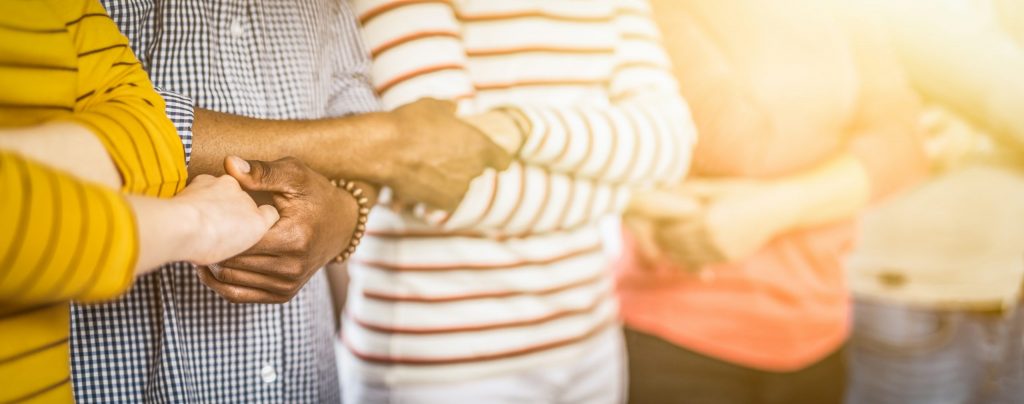By Ganoune Diop, Ph.D., General Secretary of the International Religious Liberty Association and Chair of the IF20 Antiracism Initiative
The overarching, undergirding, and root cause of the predicament of racism is the stubborn refusal to embrace the reality of one humanity, one human race. The concept of one humanity in all solidarity and justice is found in most religious traditions; however, adherents to these religious traditions struggle to embody this deep common humanity and common ancestry in how to relate to others who are different or who believe differently.

Equality, Justice, and Equity
The international community has rallied around key principles expressed as the 3 pillars of the United Nations: Peace and Security, Justice and Development, and Human Rights, the latter being subdivided into three pillars: Individual Liberty, Personal Equality, and Life in Dignity. There seems to be a consensus at a theoretical level.
The challenges of personal equality and justice and equity are today brought to the fore because of the scourge of racism.
In the concluding session of the North America Regional Meeting, I focused my remarks on the way forward towards a post-racist global order. It may at times sound aspirational, but as an old wise person intimated, “without a vision people perish” (Prov.29:18).
A Need for Multifaceted Solutions
The Problems, the evil, and the sin of racism are multifaceted. So must be the solutions. The abolition or end of racism can only be achieved—and its toxic, nefarious and harmful effects neutralized or mitigated—when addressed from comprehensive perspectives.
At systemic and structural levels, laws in place to perpetuate racism must be changed and rulings to make racism unlawful put in place. The fossilized systems of domination and economic control, established since colonial times, must be dismantled and reconfigured in all equity.
New amendments to constitutions may be one of the best ways to design a new trajectory in human consciousness regarding the necessity to welcome and embrace the dignity of every human person.
Institutional structures geared towards maintaining the injustices of discrimination, restricted access to goods, to jobs, to housing, to positions, or simply to decent living must be reformed.
This will necessitate a further mobilization—beyond the streets to chambers of law makers—to restore equity and fairness.
To help in the process and show genuine concern and good will to better human relations, one of the recommendations to the G20 decision makers could be the urgency to establish commissions and independent review mechanisms towards dismantling racism in all its forms in all governmental institutions and agencies.
Action in Institutions and Religions
Outside of governments, international institutions and organizations will also have a work of restoration to initiate. This work will also include the establishment of review mechanisms, commissions mandated to identify racial injustices, and proposed plans of action toward more justice.
After all, we do have a ratified international convention specifically addressing the need to uproot racism from our institutions, structures, and personal relations.
Suffice it to mention the ICERD:
Considering that the Universal Declaration of Human Rights proclaims that all human beings are born free and equal in dignity and rights and that everyone is entitled to all the rights and freedoms set out therein, without distinction of any kind, in particular as to race, color or national origin,
Considering that the United Nations Declaration on the Elimination of All Forms of Racial Discrimination of 20 November 1963 (General Assembly resolution 1904 (XVIII)) solemnly affirms the necessity of speedily eliminating racial discrimination throughout the world in all its forms and manifestations and of securing understanding of and respect for the dignity of the human person,
Convinced that any doctrine of superiority based on racial differentiation is scientifically false, morally condemnable, socially unjust and dangerous, and that there is no justification for racial discrimination, in theory or in practice, anywhere.
At a religious level, faith must overcome the worst of religions. Religions bring to the community of peoples from all nations lofty ideals that can be helpful; however, they are often contradicted or stifled because of quests for power, dominion, control, and overall by human greed. Persons and corporations are unlikely to relinquish any means to choose profit over people. Thus, the justification of slavery as a “divinely endorsed” practice. In one religious system, the so-called curse of Ham, the consideration of black people as inferior and as property—in another system, casteism, the stratification of society into varnas, casts, and in particular at the lower bottom (in fact, beyond classification) are the Dalit, the untouchables, those destined to be deprived of any semblance of upward mobility.
Religious people at their best embody transcendental principles and values. An illustration found in several religious traditions is the difference between justice and righteousness, underlined for example in each monotheistic religion. This righteousness goes beyond justice, as shown by for example by Jewish, Christian and Muslim thinkers.
The healing of our world from various historical transgenerational traumas can benefit from the genuine embrace of righteousness, the highest value in religious consciousness. It is, in fact, inseparable from love.
The healing of the wounds of human existence and relations is an urgent task. At personal levels, it can take the path of the regeneration of hearts and the healing of minds. Repentance—in the double sense of change of attitude and transformation of the mind.
As mentioned, racism shows certainly at societal structural levels and institutional levels. However, it also has some insidious paths through patronizing practices: paternalistic or maternalistic infantilizing attitudes towards black people or so-called people of color. Conscious or unconscious biases based on the assumption that black people lack maturity or competence to lead, to manage, or to assume positions of authority continue to linger. It could be that our world may need to embrace the true sense of the word “authority,” which is from the Latin word “augere”: to cause others to be fruitful. This requires a deeper solidarity.
Recommendations
Concretely, the G20 Interfaith Initiative on Antiracism has produced a statement on antiracism. This draft lays the foundation of the moral motivation of the participants in the G20 Interfaith Forum’s commitment to connect faith and policies for the benefit of all people anywhere, and especially the victims of global greed.
Another approach would be to call this a “wish list,” prioritizing the immediate end of suffering of victims of racism, with the aim of drafting policies to effect change towards a more human and humane world. The Initiative’s recommendations are as follows:
- To end the violence against black people. The stigmatization and brutality in the hands of police and self-appointed vigilantes are unlawful and inhumane. They need to cease. The justice system must be based on universal moral principles and values. Racial violence is sacrilegious. It despises the sacred in human beings and deprives humans of any sense of transcendence. According to most religious traditions, Humans have a special connection with the divine.
- To affirm and to protect the dignity of every human being. To adopt in all places among all people groups, the true humanization of our world through genuine acts of solidarity with the whole human family.
- To embrace a more pluralistic social configuration and a multicultural democracy.
- To repudiate the legacy and traces of colonial, constitutional, institutional, and structural racism, and to enact laws against Afrophobia, anti-Semitism, Islamophobia, xenophobia, anti-Asian sentiments and homophobia.
- To deconstruct the myth of the inferiority of black people, the alleged curses that would justify their enslavement, subjugation, submission and unfair exploitations of the resources of the African continent.
- To review our constitutions and laws to make sure racism is no longer embedded in them.
- To promote racial equality as justice reflected in economic and socio-cultural communal life.
- To reverse the plight of poor, most of whom are disenfranchised because of the color of their skin, through creative empowerment and opportunities to decent living. Blacks, by and large, have low-paying jobs, lower income and indecent housing due to centuries of discriminations that have led to racial disparities.
- To educate people against cultural insensitivity, and to promote respect of the dignity of difference.
- To put in place creative plans of actions geared towards the healing of transgenerational traumas. The experiences slavery, segregation, and disproportionate mass incarceration of African Americans compared to other ethnic groups require deliberate actions to reverse the plight and predicament of this overall underprivileged minority.
- To review policies to align them with principles and values consonant with equality, freedom and human solidarity (fraternity).
- To stop scapegoating black people and implying that the fault lies with them and to end rhetoric that promotes the following faulty view according to which “things will be better if they behave and improve their station.”
To better the condition of living of the whole human family, in peaceful coexistence in all equity and equality before the law, and before the sanctity of every person’s life, changes are needed. Deliberate personal and corporate endeavors are needed today.
It could be that when religious actors and people of good will rediscover what it means that human beings are sacred, more important than holy sites, more important than holy places, we will be at a better place. Humans are called temples of the Holy Spirit. Every person is a mystery, beyond just being a biological being. Human conscience, the inner sanctuary in each person, should never be violated. Disregarding a person’s freedom of conscience is in fact denying that person’s humanity and uniqueness.
When reconciliation or genuine lifestyle of hospitality is embraced, adopted and practiced, racism will have no tolerated space in our relations to one another. Lawmakers can then join to help enact laws to protect the dignity of every person in all respect of the sanctity of every person’s life.
May the conversation and the partnership and the work continue until we reach a better place and space where sacrificial love becomes the atmosphere we bask in.
Ganoune Diop, Ph.D., is General Secretary of the International Religious Liberty Association and Director of Public Affairs and Religious Liberty at the General Conference of Seventh-day Adventist World Headquarters. He serves on the G20 Interfaith Forum Board of Directors and the Anti-Racism Working Group.


